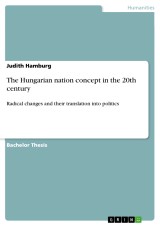Details

The Hungarian nation concept in the 20th century
Radical changes and their translation into politics1. Auflage
|
18,99 € |
|
| Verlag: | Grin Verlag |
| Format: | EPUB, PDF |
| Veröffentl.: | 14.04.2008 |
| ISBN/EAN: | 9783638035835 |
| Sprache: | englisch |
| Anzahl Seiten: | 51 |
Dieses eBook erhalten Sie ohne Kopierschutz.
Beschreibungen
Bachelor Thesis from the year 2006 in the subject Cultural Studies - East European Studies, grade: 9,00 (niederländ. Notenskala), Maastricht University (Faculteit der Cultuur- en Maatschappijwetenschappen), language: English, abstract: The underlying essay deals with the Hungarian nation, one of the current Central and Eastern European nations that underwent the mentioned developments during the 20th century. What distinguishes the Hungarian nation from most of its neighbours in the region is the fact that following the dissolution of the Habsburg empire after the First World War, Hungary did not gain sovereignty at long last over its territories and an own nation state, but lost a considerable part of its territories and ethnic nationals
This massive reduction of the country’s size and population left a deep mark on Hungarian national consciousness, and the Hungarians inevitably had to redefine their concept of the Hungarian nation.
Thus in the Hungarian case, the issue of the national minorities outside the state is intimately connected to the concept of the Hungarian nation, while, however, there exist of course several other profound aspects that define the nation concept, such as culture and traditions or the so-called historical ‘myths’. This concept of the nation in turn influences how the Hungarian state deals with its minorities, and how it handles minority politics in the framework of its foreign politics, but also in the sphere of domestic policy and concerning ethnic minorities living on the territory of the Hungarian state. Finally, the concept of ‘Europe’ as a cultural entity as well as the potential influence of the Western European powers on Hungary and the CEE region in general, also play an important role in the image of the ‘national self’ as well as in its translation into actual politics.
The underlying paper analyses how the concept of the nation influences and is worked out in actual minority politics. The analysis will focus on those two time periods when the Hungarian elite could lead its country relatively independently, namely the period after the First World War, and the period after the fall of the Communist party in 1989.
This massive reduction of the country’s size and population left a deep mark on Hungarian national consciousness, and the Hungarians inevitably had to redefine their concept of the Hungarian nation.
Thus in the Hungarian case, the issue of the national minorities outside the state is intimately connected to the concept of the Hungarian nation, while, however, there exist of course several other profound aspects that define the nation concept, such as culture and traditions or the so-called historical ‘myths’. This concept of the nation in turn influences how the Hungarian state deals with its minorities, and how it handles minority politics in the framework of its foreign politics, but also in the sphere of domestic policy and concerning ethnic minorities living on the territory of the Hungarian state. Finally, the concept of ‘Europe’ as a cultural entity as well as the potential influence of the Western European powers on Hungary and the CEE region in general, also play an important role in the image of the ‘national self’ as well as in its translation into actual politics.
The underlying paper analyses how the concept of the nation influences and is worked out in actual minority politics. The analysis will focus on those two time periods when the Hungarian elite could lead its country relatively independently, namely the period after the First World War, and the period after the fall of the Communist party in 1989.

















